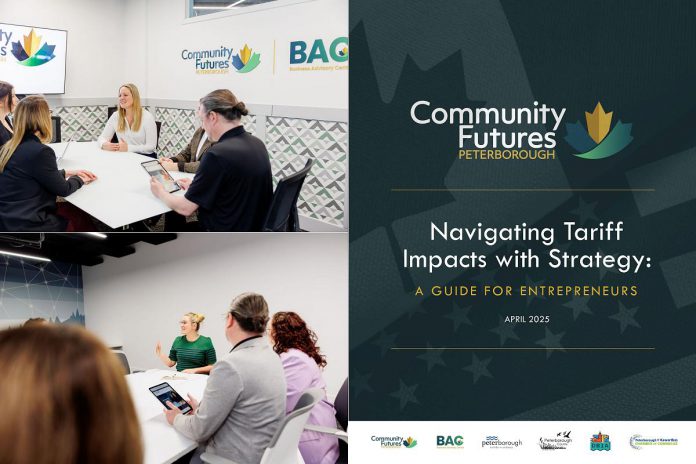
Community Futures Peterborough and municipal and business organization partners recently launched a new resource aimed at helping local businesses navigate the current economic challenges related to the current trade dispute with the U.S.
Community Futures Peterborough — in collaboration with the Business Advisory Centre, the City of Peterborough, the County of Peterborough, the Peterborough Downtown Business Improvement Area (DBIA), and the Peterborough and the Kawarthas Chamber of Commerce — has developed the “tariff toolkit” as a strategic resource to support businesses in the community.
Called “Navigating Tariff Impacts with Strategy: A Guide for Entrepreneurs,” the free toolkit can be downloaded at communityfuturespeterborough.ca/programs/tariff-toolkit/.
With shifting trade conditions between Canada and the U.S. creating uncertainty for local businesses, “businesses need actionable strategies to navigate these challenges effectively,” a media release noted.
Community Futures Peterborough and its partners met at Market Hall Performing Arts Centre in Peterborough earlier in March to connect businesses with industry experts who provided initial guidance on minimizing the impact of tariffs.
“Our businesses are the backbone of our local economy — employing our friends, families, and neighbours, while producing high-quality goods and services,” said Peterborough County Warden Bonnie Clark in the release.
“Tariffs and global uncertainty are taking a toll and having an impact on our businesses. This toolkit is designed to strengthen small businesses as they work through these imposed tariffs and consider diversifying their strategies, products, and services.”
While U.S. President Donald Trump recently paused global reciprocal tariffs over 10 per cent for a 90-day period, the previously announced tariffs on Canada — including on aluminum and steel and the auto sector — remain in place. The U.S. also imposed substantial tariffs on China, only then to create exceptions for some electronic products.
The specifics of the tariffs may change but the need for businesses to rethink their approach to trade remains constant, the partners said.
“We have always been mindful of not only the direct impacts tariffs themselves have on businesses but also tariff speculation and lasting change in consumer buying patterns,” said of Community Futures Peterborough executive director Devon Girard. “Those are the effects our area businesses are feeling right now.”
The tariff toolkit aims to offer both insights and “actionable steps” that businesses can work on with their advisors “to develop a resilient approach” to international trade. It is intended to serve as “a practical resource to help businesses assess their current trade strategies and explore new opportunities.”
The toolkit contains guidance in key areas, including understanding the financial impact of tariffs, identifying alternative sourcing strategies, expanding customer bases beyond tariff-affected regions, mitigating financial exposure through hedging and risk management, repositioning brand messaging in response to trade shifts, and leveraging local and international partnerships to drive growth.
“Businesses have the opportunity to thrive when the marketplace is stable and predictable,” said Peterborough-Kawartha MP Dave Smith.
“The unpredictability thrust on the global market by the Republican administration in the United States has placed us in an unstable situation that is difficult for any industry to navigate. Initiatives like the Tariff Toolkit from Community Futures provide our local job creators with some tools to help them navigate this uncertain time and find ways to better position themselves to have the resilience needed to successfully navigate the choppy waters and come out stronger.”
Meanwhile, Warden Clark, who also serves as chair of the Eastern Ontario Wardens’ Caucus (EOWC), has been vocal for some time about the issue of tariffs and their impact on eastern Ontario communities.
With the issue being one of the EOWC’s top priorities, the caucus has gathered a lot of regional data and has reached out to allies across the borders and local chambers of commerce to “share our region’s sectors and businesses and financial impacts,” Clark said.
In February, the EOWC held a special meeting to pass the resolution “EOWC Support of Canadian and Ontario Governments’ Negotiations with the United States Government on Trade Tariffs.”
The EOWC recommended its federal and Ontario government partners invest in infrastructure and housing to stimulate and stabilize Canada’s economy and create jobs, eliminate trade and legislative barriers to ensure municipalities can buy locally, and remove any impediments to ensure municipalities can give preference to Canadian companies in capital projects and for other supplies.


























